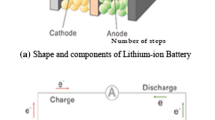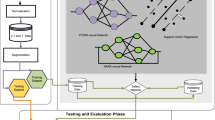Abstract
Batteries for electric vehicles (EVs) have a capacity decay issue as they age. As a result, the use of lithium-ion is becoming more popular with super-capacitors (SCs), particularly in EVs. Over the decrease of carbon dioxide emissions, SC batteries offer a substantial benefit. In EVs, a dependable mechanism that guarantees the SC batteries’ capacity for charging and discharging is crucial. The main obstacle for EVs is the long life of ultra-capacitor battery’s because SCs have a deterioration effect over multiple cycles. Therefore, accurate early prediction of these SC batteries is crucial. The data-based model is more accurate than mechanism-based and model-based methods created for this purpose. The proposed data-driven models, such as machine learning (ML), estimate the electrical parameters for the smooth functioning and working of SCs in addition to considering their operating status. The main factor determining whether electric vehicles can be sustained is an increase in battery cycle life. With a lowest root mean square error of 0.04614 and a mean squared error of 0.002 and an accuracy of 89.6%, ML-based models with various architectures and topologies have been created in this study to reliably estimate the deterioration of SCs capacitance.













Similar content being viewed by others
References
Manisalidis, I.; Stavropoulou, E.; Stavropoulos, A.; Bezirtzoglou, E.: Environmental and health impacts of air pollution: a review. Front. Public Health 8, 14 (2020)
Khadgi, J.; Thapa, R.; Prasai Joshi, T.; Maskey Byanju, R.: Effectiveness of vehicle-free zone in reducing air pollution. Int. J. Environ. Sci. Technol. 19(2), 839–850 (2022)
Heydarzadeh, H.; Jafari, H.; Karimi, S.: Effects of meteorological parameters and fuel composition on the air pollution production from motor vehicles. Environ. Monit. Assess. 194(4), 236 (2022)
Hu, Q.; Wu, X.; Bian, L.: Comprehensive diagnosis model of environmental impact caused by expressway vehicle emission. Environ. Monit. Assess. 194(11), 796 (2022)
College of Electrical Engineering, Qingdao University, Qingdao, 266071, China and Kai, W.: Synthesis of porous carbon by activation method and its electrochemical performance. Int. J. Electrochem. Sci. 10766–10773, (2018)
Jameel, A.; Gulzar, M. M.: Load frequency regulation of interconnected muli-source multi-area power system with penetration of electric vehicles aggregator. (2023)
Henry, B.: Two billion vehicles projected to be on roads by 2035. Christian Sci. Monit. (2022)
Wu, C.H.; Hung, Y.H.; Hong, C.W.: On-line supercapacitor dynamic models for energy conversion and management. Energy Convers. Manage. 53(1), 337–345 (2012)
Murawwat, S.; Gulzar, M.M.; Alzahrani, A.; Hafeez, G.; Khan, F.A.; Abed, A.M.; et al.: State of charge estimation and error analysis of lithium-ion batteries for electric vehicles using kalman filter and deep neural network. J. Energy Storage 72, 108039 (2023)
Berecibar, M.: Accurate predictions of lithium-ion battery life. Nature 568(7752), 325–326 (2019)
Jing, W.; Lai, C. H.; Wong, W.; Wong, M.: A comprehensive study of battery-supercapacitor hybrid energy storage system for standalone pv power system in rural electrification: Semantic scholar. (1970)
Weigert, T.; Tian, Q.; Lian, K.: State-of-charge prediction of batteries and battery-supercapacitor hybrids using artificial neural networks. J. Power Sources 196(8), 4061–4066 (2011)
Azaïs, P.; Duclaux, L.; Florian, P.; Massiot, D.; Lillo-Rodenas, M.; Linares-Solano, A.; Peres, J.; Jehoulet, C.; Béguin, F.: Causes of supercapacitors ageing in organic electrolyte. J. Power Sources 171, 1046–1053 (2007)
Becker, H.I.: Low voltage electrolytic capacitor. Patentus 2(800), 6160 (2022)
Sharma, P.; Bhatti, T.S.: A review on electrochemical double-layer capacitors. Energy Convers. Manage. 51(12), 2901–2912 (2010)
Gulzar, M.M.; Iqbal, A.; Sibtain, D.; Khalid, M.: An innovative converterless solar pv control strategy for a grid connected hybrid pv/wind/fuel-cell system coupled with battery energy storage. IEEE Access 11, 23245–23259 (2023)
Wang, G.; Zhang, L.; Zhang, J.: Cheminform abstract: a review of electrode materials for electrochemical supercapacitors. Chem. Soc. Rev. 41, 797–828 (2011)
Largeot, C.; Portet, C.; Chmiola, J.; Taberna, P.-L.; Gogotsi, Y.; Simon, P.: Relation between the ion size and pore size for an electric double-layer capacitor. J. Am. Chem. Soc. 130, 2730–2731 (2008)
Wang, G.; Zhang, L.; Zhang, J.: A review of electrode materials for electrochemical supercapacitors. Chem. Soc. Rev. 41, 797–828 (2011)
Snook, G.A.; Kao, P.; Best, A.S.: Conducting-polymer-based supercapacitor devices and electrodes. J. Power Sources 196(1), 1–12 (2011)
Xu, D.; Cen, H.: A hybrid energy storage strategy based on multivariable fuzzy coordinated control of photovoltaic grid-connected power fluctuations. IET Renew. Power Gener. 15(8), 1826–1835 (2021)
Liu, Y.; Wang, S.; Xie, Y.; Fernandez, C.; Qiu, J.; Zhang, Y.: A novel adaptive h-infinity filtering method for the accurate soc estimation of lithium-ion batteries based on optimal forgetting factor selection. Int. J. Circuit Theory Appl. 50(10), 3372–86 (2022)
Zhou, D.; Li, Z.; Zhu, J.; Zhang, H.; Hou, L.: State of health monitoring and remaining useful life prediction of lithium-ion batteries based on temporal convolutional network. IEEE Access 8, 53307–53320 (2020)
Zhou, Y.; Huang, Z.; Li, H.; Peng, J.; Liu, W.; Liao, H.: A generalized extended state observer for supercapacitor state of energy estimation with online identified model. IEEE Access 6, 27706–27716 (2018)
Wang, C.; Xiong, R.; Tian, J.; Lu, J.; Zhang, C.: Rapid ultracapacitor life prediction with a convolutional neural network. App. Energy 305, 117819 (2022)
Lü, X.; Qu, Y.; Wang, Y.; Qin, C.; Liu, G.: A comprehensive review on hybrid power system for PEMFC-HEV: Issues and strategies. 171, 1273–1291, (2018). [Online]. Available: https://www.sciencedirect.com/science/article/pii/S0196890418306745
Koubaa, R.; Bacha, S.; Smaoui, M.; krichen, L.: Robust optimization based energy management of a fuel cell/ultra-capacitor hybrid electric vehicle under uncertainty. 200, 117530, (2020). [Online]. Available: https://www.sciencedirect.com/science/article/pii/S036054422030637X
Wu, J.; Zhang, C.; Chen, Z.: An online method for lithium-ion battery remaining useful life estimation using importance sampling and neural networks. 173, 134–140, (2022). [Online]. Available: https://www.sciencedirect.com/science/article/pii/S0306261916304846
Zhou, Y.; Huang, Y.; Pang, J.; Wang, K.: “Remaining useful life prediction for supercapacitor based on long short-term memory neural network. 440, 227149, (2022). [Online]. Available: https://www.sciencedirect.com/science/article/pii/S0378775319311425
Zhou, D.; Li, Z.; Zhu, J.; Zhang, H.; Hou, L.: “State of health monitoring and remaining useful life prediction of lithium-ion batteries based on temporal convolutional network,” 8, 53307–53320, (2020), conference Name: IEEE Access.
Zhao, Q.; Qin, X.; Zhao, H.; Feng, W.: A novel prediction method based on the support vector regression for the remaining useful life of lithium-ion batteries. 85, 99–108, (2022). [Online]. Available: https://www.sciencedirect.com/science/article/pii/S0026271418301690
(2022) Capacity estimation of lithium-ion cells by combining model-based and data-driven methods based on a sequential extended kalman filter - ScienceDirect. [Online]. Available: https://www.sciencedirect.com/science/article/abs/pii/S0360544220323409
Wang, C.; Xiong, R.; Tian, J.; Lu, J.; Zhang, C.: Rapid ultracapacitor life prediction with a convolutional neural network. 305, 117819, (2022). [Online]. Available: https://www.sciencedirect.com/science/article/pii/S0306261921011491
Severson, K.A.; Attia, P.M.; Jin, N.; Perkins, N.; Jiang, B.; Yang, Z.; Chen, M.H.; Aykol, M.; Herring, P.K.; Fraggedakis, D.; Bazant, M.Z.; Harris, S.J.; Chueh, W.C.; Braatz, R.D.: Data-driven prediction of battery cycle life before capacity degradation. Nat. Energy 4(5), 383–391 (2019)
Wei, J.; Dong, G.; Chen, Z.: Remaining useful life prediction and state of health diagnosis for lithium-ion batteries using particle filter and support vector regression. IEEE Trans. Industr. Electron. 65(7), 5634–5643 (2018)
Zhu, M.; Weber, C.; Yang, Y.; Konuma, M.; Starke, U.; Kern, K.; Bittner, A.: “Chemical and electrochemical ageing of carbon materials used in supercapacitor electrodes,” (Jul 2008).
Wenzl, H.; Baring-Gould, E.; Kaiser, R.; Liaw, B.; Lundsager, P.; Manwell, J.; Ruddell, A.; Svoboda, V.: Life prediction of batteries for selecting the technically most suitable and cost effective battery. J. Power Sources 144, 373–384 (2005)
Zhou, Y.; Wang, Y.; Wang, K.; Kang, L.; Peng, F.; Wang, L.; Pang, J.: Hybrid genetic algorithm method for efficient and robust evaluation of remaining useful life of supercapacitors. Appl. Energy 260, 114169 (2020)
Chen, C.; Xiong, R.; Yang, R.; Shen, W.; Sun, F.: State-of-charge estimation of lithium-ion battery using an improved neural network model and extended kalman filter. J. Clean. Prod. 234, 06 (2019)
Tang, X.; Yao, K.; Liu, B.; Hu, W.; Gao, F.: Long-term battery voltage, power, and surface temperature prediction using a model-based extreme learning machine. Energies 11(1), 86 (2018)
Liu, C.; Li, D.; Wang, L.; Li, L.; Wang, K.: Strong robustness and high accuracy in predicting remaining useful life of supercapacitors. APL Mater. 10(6), 061106 (2022)
Xuli Chen, L.D.; Paul, R.: Carbon-based supercapacitors for efficient energy storage. Nat. Sci. Rev. 4, 1–37 (2017)
Se, S.; Freeman, N.: Fuel cells and ultracapacitors in light mobility applications, 21st electric vehicle symposium.
Ren, J.; Lin, X.; Liu, J.; Han, T.; Wang, Z.; Zhang, H.; Li, J.: Engineering early prediction of supercapacitors’ cycle life using neural networks. Mater. Today Energy 18, 100537 (2020)
Acknowledgements
The authors are grateful for the support in dataset generation provided by Jinjin Li [44]. The dataset used in this paper can be accessed freely from https://doi.org/10.1016/j.mtener.2020.100537.
Author information
Authors and Affiliations
Corresponding author
Additional information
The research presented in this paper builds upon the foundation laid by the submitted thesis titled: ’Electric Vehicles Super-capacitor’s Remaining Useful Life Using Neural Network’, 2022.
Rights and permissions
Springer Nature or its licensor (e.g. a society or other partner) holds exclusive rights to this article under a publishing agreement with the author(s) or other rightsholder(s); author self-archiving of the accepted manuscript version of this article is solely governed by the terms of such publishing agreement and applicable law.
About this article
Cite this article
Gillani, S.WuH., Shahid, K., Gulzar, M.M. et al. Remaining Useful Life Prediction of Super-Capacitors in Electric Vehicles Using Neural Networks. Arab J Sci Eng 49, 7327–7340 (2024). https://doi.org/10.1007/s13369-024-08766-4
Received:
Accepted:
Published:
Issue Date:
DOI: https://doi.org/10.1007/s13369-024-08766-4




